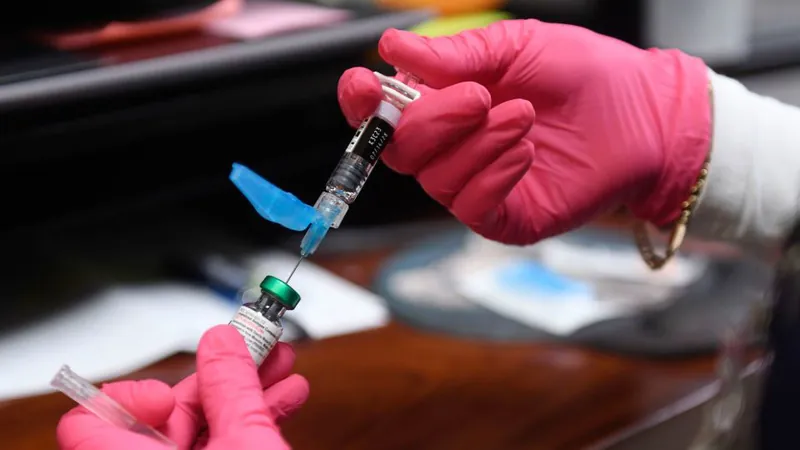
Alcohol Consumption Rising as a Major Cancer Risk: What You Need to Know!
2025-01-16
Author: Emma
Understanding the Risks
Recent revelations from the U.S. surgeon general have linked alcohol consumption to an alarming seven types of cancer, emphasizing the urgent need for public awareness and behavioral change around drinking habits. In an unprecedented advisory, Surgeon General Vivek Murthy, M.D., M.B.A., has called for the inclusion of cancer warnings on alcoholic beverage labels.
Statistics and Findings
Although the relationship between alcohol and cancer has been known for years, the report sheds light on the specifics of how alcohol contributes to the disease. Shockingly, it ranks as the third-leading preventable cause of cancer in the U.S., only trailing behind tobacco and obesity, with an estimated 100,000 new cases and 20,000 deaths attributed to alcohol each year. This statistic starkly outpaces the number of alcohol-related traffic fatalities, which stands at about 13,500 annually.
Breast Cancer Connection
One of the most distressing findings in the advisory reveals that over 16% of breast cancer cases can be linked directly to alcohol consumption. High alcohol intake elevates estrogen levels, a key driver in breast cancer development. The report breaks down the biochemical mechanisms that lead to cancer, such as the conversion of alcohol into acetaldehyde, a substance that damages DNA. Furthermore, alcohol can induce oxidative stress, promoting inflammation and increasing the absorption of carcinogenic compounds.
Global Perspectives
The surgeon general's advisory comes on the heels of a 2023 declaration from the World Health Organization (WHO), stating there is no safe level of alcohol consumption. This marks a stark contrast to previous recommendations, emphasizing the need for urgent dialogues about alcohol's health risks. While many countries have adopted some form of health warning labels for alcohol, only South Korea mandates specific cancer warnings. Ireland is anticipating the adoption of similar measures by 2026.
Expert Opinions
Experts like Dr. Jones express skepticism over whether the advisory will significantly alter drinking behaviors. "Changing habits will depend on one's access to resources and mental health support," she notes. Additionally, she highlights the importance of ongoing public awareness campaigns to reinforce the risks associated with alcohol consumption.
Cultural Shifts
As societal attitudes begin to shift, with movements like Dry January and Sober October gaining popularity, there is a greater willingness to discuss alcohol's role in health. The surgeon general's report suggests that current dietary guidelines, which recommend a maximum of two drinks per day for men and one for women, may need re-evaluation as the understanding of alcohol's risks deepens.
Recommendations for Healthcare Providers
To catalyze change, Dr. Lopes encourages healthcare providers to integrate alcohol-related discussions into routine patient evaluations, marking a critical step towards a comprehensive approach to cancer prevention. Dr. Datta, a leading surgical oncologist, emphasizes the importance of educating patients on how alcohol negatively affects recovery and immune function, viewing the advisory as a pivotal moment for medical practices.
Conclusion
This advisory signals a significant shift in public health strategy, urging a more holistic view of cancer prevention that encompasses lifestyle choices alongside genetic and environmental factors. As we navigate this evolving narrative, addressing the cultural and systemic challenges in altering alcohol consumption patterns will be essential.
In summary, the message is clear: "Alcohol is a carcinogen, like tobacco and asbestos," states Dr. Rossi. As both a societal and healthcare challenge, it's crucial for individuals to understand the risks and take proactive steps to reduce their alcohol consumption—potentially lowering their cancer risk in the process. It's time to rethink our relationship with alcohol for a healthier tomorrow!









 Brasil (PT)
Brasil (PT)
 Canada (EN)
Canada (EN)
 Chile (ES)
Chile (ES)
 Česko (CS)
Česko (CS)
 대한민국 (KO)
대한민국 (KO)
 España (ES)
España (ES)
 France (FR)
France (FR)
 Hong Kong (EN)
Hong Kong (EN)
 Italia (IT)
Italia (IT)
 日本 (JA)
日本 (JA)
 Magyarország (HU)
Magyarország (HU)
 Norge (NO)
Norge (NO)
 Polska (PL)
Polska (PL)
 Schweiz (DE)
Schweiz (DE)
 Singapore (EN)
Singapore (EN)
 Sverige (SV)
Sverige (SV)
 Suomi (FI)
Suomi (FI)
 Türkiye (TR)
Türkiye (TR)
 الإمارات العربية المتحدة (AR)
الإمارات العربية المتحدة (AR)